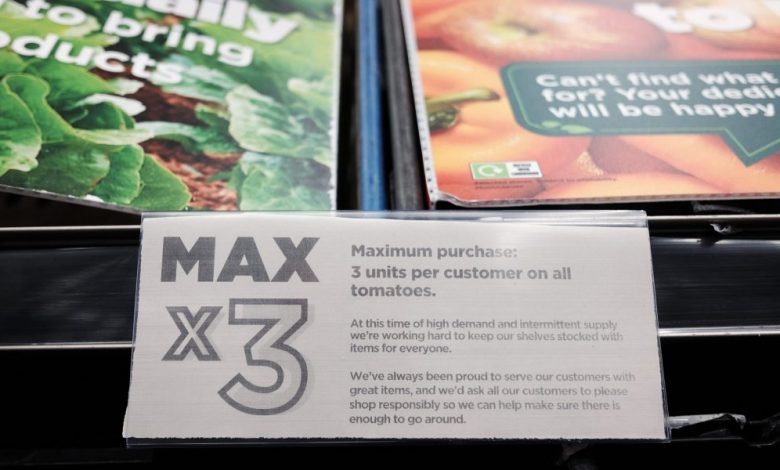British supermarkets are rationing fresh fruit and vegetables

Tomatoes, cucumbers and a host of other vegetables are becoming increasingly difficult to come by in the UK.
Several of the country’s largest supermarkets have introduced rationing policies for certain fresh produce as unfavorable conditions in mainland Europe and North Africa have disrupted supplies and left grocery store shelves empty across the country. Experts say the country’s Brexit, which only came into full effect in January 2021, is not primarily to blame – despite all suspicions – as shortages have also emerged in EU member Ireland.
The National Farmers’ Union, which represents farmers in England and Wales, said the industry is repeatedly seeing a “predictable combination” of energy costs and inclement weather, resulting in empty supermarket shelves.
“Our food resilience in the UK is currently gone,” NFU vice-president David Exwood said in a statement this week. “Producers must have the trust they need, operate within a fair and transparent supply chain, and ensure fair and sustainable returns so they can do what they do best; produce nutritious, high quality British food to meet shopper demand.”
Thanks to its climate, the UK imports much of its fruit and vegetable supply from warmer parts of the world, especially outside of the summer months. In winter, the country relies even more on imports to supply its supermarkets with fresh, off-season fruit and vegetables.
Year-round, the vast majority of its fruit and vegetable imports come from the EU and Africa.
As crop yields were impacted by adverse weather in source markets, officials from grocery chains Tesco, Asda, Morrisons and Aldi confirmed this wealth on Thursday that they had begun rationing supplies of tomatoes, cucumbers and peppers and limiting customers to two or three of each item per transaction.
The companies are the 1st, 3rd, 4th and 5th largest grocery chains in the UK in terms of market share, according to data from market research firm Kantar.
Jane Sherwood-Getty Images
Morrisons said it would also limit purchases of lettuce, while Asda confirmed it had applied its own rationing policy to eight products: tomatoes, peppers, cucumbers, lettuce, prepared lettuce pouches, broccoli, cauliflower and raspberries.
A spokesman for Asda said wealth The company has been hit by supply shortages for some produce grown in southern Spain and North Africa.
“We have implemented a temporary limit of three products on a very small number of fruit and vegetable lines to allow customers to pick up the products they are looking for,” they said.
In a statement, Andrew Opie, director of food and sustainability at the British Retail Consortium, said the disruption was expected to last for a few weeks, but added that supermarkets “are able to manage supply chain issues and are working with farmers.” to ensure customers have access to a wide range of fresh produce.”
Have the shortages spread beyond the UK?
Vegetable shortages in the UK have raised concerns about hoarding in the coming weeks.
On Thursday it was reported that a woman was banned from her local grocery store after trying to buy 100 pickles.
While some, including Liz Webster, leader of activist group Save British Food, have pointed the finger at Brexit for creating trade barriers that make it difficult for EU goods to export to the UK, others have suggested that the root cause of the UK’s supply shortages is more complex.
Although consumers in many other EU countries have not been affected by the supply shortages, the Republic of Ireland has also been hit by fresh vegetable shortages despite being an EU member state.
Coexphal, a Spanish trade organization made up of 101 fruit and vegetable companies in the southern province of Almería and other Spanish growers, said The guard on Thursday that although post-Brexit logistics had played a role in creating shortages, crop yields for several vegetables had fallen by more than 20% this season thanks to unexpected temperature drops, making it “virtually impossible,” many said to fulfill their obligations.
Meanwhile, the European farmers’ association Copa-Cogeca told the BBC that the ability of European producers to coordinate within the vast EU single market during a supply tightening meant goods were more likely to stay within the economic bloc.
The shortages could also be more pronounced in the UK than elsewhere in Europe due to the UK’s ongoing energy crisis, which has pushed fuel costs to prohibitive levels for millions in the country.
According to NFU research, the cost of growing a tomato in the UK has increased by 27% in 2021.
Jack Ward, CEO of the British Growers Association, told Euronews that rising production costs have caused many British farmers to stop growing certain crops – leading to a deficit that European imports can now not fill.
Even in Kherson, a city on the front lines of war-torn Ukraine, supermarket shelves are full of fresh vegetables, according to Lindsey Hilsum, international editor of Britain’s Channel 4 News.
There’s no tomato shortage here – but I’m in Kherson, a front-line Ukrainian city that’s being shelled daily by the Russians, and not in a British supermarket. pic.twitter.com/FFbVAf1zHC
— Lindsey Hilsum (@lindseyhilsum) February 23, 2023
According to the EU Center for the Promotion of Imports from Developing Countries, most of Ukraine’s fresh vegetable imports come from West and Central Asia.
Outside of Europe, the US has become increasingly dependent on other markets for its fresh vegetable supply since the early 2000s — with imports rising nearly 200% over the past two decades — but the vast majority of its source markets are much closer to home than those , which are currently rocking the UK supply chain.
Official data shows that in 2020, 77% of fresh vegetables imported into the United States came from Mexico, while 11% came from Canada.
Learn how to navigate and build trust in your organization with The Trust Factor, a weekly newsletter exploring what leaders need to succeed. Login here.



